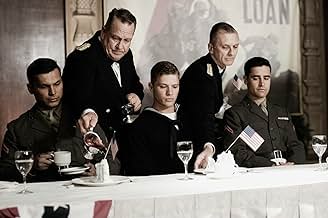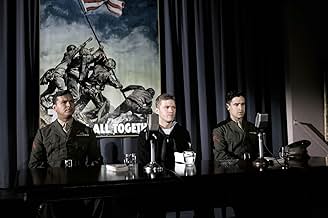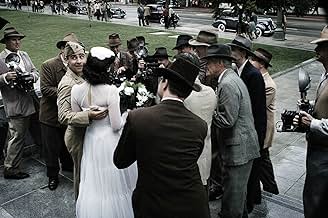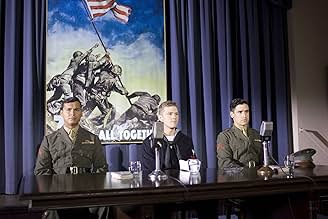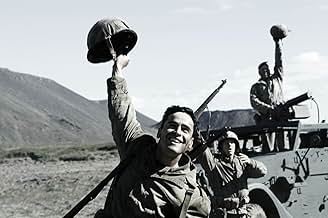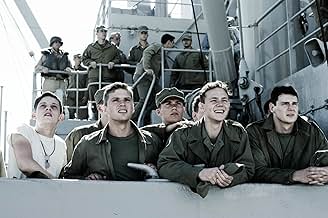The life stories of the six men who raised the flag at the Battle of Iwo Jima, a turning point in World War II.The life stories of the six men who raised the flag at the Battle of Iwo Jima, a turning point in World War II.The life stories of the six men who raised the flag at the Battle of Iwo Jima, a turning point in World War II.
- Nominated for 2 Oscars
- 16 wins & 28 nominations total
Featured reviews
I must admit, this one has elements of greatness in almost every department, but somehow these don't quite glue together as intended. The film seems to suffer from three evenly strong-handed approaches. The script by Paul Haggis eagerly wants to take us on an emotional roller-coaster in the second half, where the focus increasingly shifts to the story of Ira Hayes in the aftermath of the battle. There's obviously a strong hand of Steven Spielberg, who always wants to show us the human side of the story, which Clint obviously wants too, but he tends to do it in a different way. There seems to be a clash of wills, with these three major forces at work here. Ultimately, FLAGS OF OUR FATHERS is not about the war proceedings itself, but how the war affected the men who fought in it themselves, and how they refused to be seen as heroes.
It's hard to dislike any of Clint Eastwood's films and with this one, and the follow-up LETTERS FROM IWO JIMA, he made two films of epic proportions, that will undoubtedly compete for the Oscars. Both of the films that is, as they were released by different distributors, "Flags" is with Dreamworks and "Letters" with Warner Brothers.
We'll see, so far, so good. I wasn't blown away by this one, but certainly a film to respect. Difficult to judge this, before seeing the follow-up LETTERS FROM IWO JIMA, which shows the Japanese perspective of the story. I strongly suspect Clint saved the best for last and that "Letters" will be his ultimate showcase.
Camera Obscura --- 7/10
It is true that nations define themselves in large part through film and especially war films. It is true that solipsism reigns when matters of national honor are raised. This film pulls the legs from under such cheap theatrics while doing the very same thing. Its a characteristic of Eastwood that drives me crazy, how quick he is to polish ideals so they glisten next to the other guy's clichés, in this case Spielberg's "Private Ryan," which in retrospect was pretty bad storytelling.
So. Let's spank Clint for hypocrisy, for metaphorically taking the first flag. But I think much of the blame for that goes to Paul Haggis, a scourge now in full infection in Hollywood. He won't hesitate to use any device in the spine of his work, no matter how trite.
And let's wonder every time we see a war, even one like this.
But let's also give the man his due for storytelling. This is fantastic visual storytelling. Multiple narrators, multiple framing devices. Nonlinear presentation with time reversals motivated by flashbacks, memories, tales told. The business about walking 1300 miles to tell the truth, and the business about old men finally telling the truth to the son. Its what I call a folding device to underscore that we are seeing the truth, the story within the story.
The pacing is perfect, even a bit too manufactured for my taste. The most effective war film in terms of confusion and lack of theater is "Thin Red Line," I believe. The scale of the thing, both in the battles and bond events was impressive. The phrasing is tasteful, but when an episode finished, I couldn't help but be aware that I was being sold an image I was expected to wear.
Its enough to drive me to drink.
Ted's Evaluation -- 2 of 3: Has some interesting elements.
Did you know
- TriviaThe story about the flag raising being posed was true. It was started, ironically, by Joe Rosenthal. He did not know he had taken the famous photograph until he returned to the States. He did, however, take a second photograph of the five Marines and one Navy Corpsman gathered around the flag. When people asked if he had posed the photograph, he, thinking they were referring to the second photograph said "Of course". It was only after seeing the first photograph that he realized they were referring to that photograph and not the second one.
- GoofsIn explaining the importance of a successful bond drive, the treasury representative says that the fuel dumps are empty and "our Arab friends only take bullion." At the time of World War II, America was essentially self sufficient in oil production and not dependent on Arab oil. While oil was discovered in some Arab countries before the war, it was not extensively developed until after the war.
- Quotes
[last lines]
James Bradley: I finally came to the conclusion that he maybe he was right. Maybe there's no such thing as heroes. Maybe there are just people like my dad. I finally came to understand why they were so uncomfortable being called heroes. Heroes are something we create, something we need. It's a way for us to understand what's almost incomprehensible, how people could sacrifice so much for us, but for my dad and these men, the risks they took, the wounds they suffered, they did that for their buddies. They may have fought for their country but they died for their friends. For the man in front, for the man beside him, and if we wish to truly honor these men we should remember them the way they really were, the way my dad remembered them.
- Crazy creditsThere is an additional short sequence after the credits have ended.
- SoundtracksKnock Knock
Written and Performed by Kyle Eastwood, Michael Stevens, Andrew McCormack and Graeme Flowers
Details
- Release date
- Country of origin
- Official sites
- Language
- Also known as
- La conquista del honor
- Filming locations
- Production companies
- See more company credits at IMDbPro
Box office
- Budget
- $90,000,000 (estimated)
- Gross US & Canada
- $33,602,376
- Opening weekend US & Canada
- $10,245,190
- Oct 22, 2006
- Gross worldwide
- $65,900,249
- Runtime
- 2h 15m(135 min)
- Color
- Sound mix
- Aspect ratio
- 2.39 : 1







